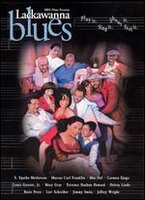 My Take on the Movies
My Take on the MoviesA Mini-Review of
LACKAWANNA BLUES
By: A. L. “Toni” Anderson
Lackawanna Blues is an original HBO film (2005), which first aired on February 12 and is being re-aired throughout this week. It is based on the life of screenwriter Ruben Santiago-Hudson, and tells the story of his youth spent in the early 1960s in Lackawanna, New York (near Brooklyn). The film is co-executive produced by Halle Berry and stars S. Epatha Merkerson (Law & Order) as Nanny and Marcus Carl Franklin as Ruben. It features an entire cast of notable Black actors, including Louis Gossett Jr., Ernie Hudson, rapper-turned-actor Mos Def, singer Macy Gray, Terrence Dashon Howard (The Best Man - 1999), and Delroy Lindo, numerous stars whose credits are too lengthy to list here.
The film opens with an aged Nanny on what appears to be her death-bed. After a middle-of-the-night telephone call, a grown-up Ruben rushes to her side, and attempts to coax her back into the land of the living by his sheer will. The story is told mostly through flashbacks, to when Ruben was a small child left in his room alone by his mom (Carmen Ejogo). Neither his mom nor his dad (Jimmy Smits) is quite fit to take care of him, and so he devolves into the care of Nanny, who has previously lost a child of her own.
Ruben’s childhood is primarily lived in a rooming house owned by Nanny. Through this rooming house (and Ruben’s life) a huge cast of characters passes, each of whom apparently has something “missing.” Mr. Lucious (Lindo) is missing an arm which he lost as a result of defending a woman’s honor. The blues singer is missing his eyesight (and several teeth). Macy Gray’s character, Pauline, seems to be missing half of her mind.
The real theme of the movie is “community.” Each transient in the rooming house (made up of a composite of the many people the real Nanny took in and nurtured over time) provides an essential ingredient in Ruben’s development. Mr. Paul (Jeffrey Wright) teaches Ruben about the history of the civil rights movement, and Ruben eats it all up as though it were candy.
We are privy to the regular Friday night fish fry, with its bright colors and sounds, and we can almost smell the food. Even though we are looking through a child’s eyes, we also are privy to the night life which takes place in something akin to a juke joint, where love is as sharp and hard as a razor’s edge.
As is customary in Black films, life in Lackawanna is permeated with music (by Meshell Ndegeocello), hence the title Lackawanna Blues. But as in our everyday lives, the “blues” is also infused with joy. Unfortunately, it often does not last. By the time Ruben grows up and returns home, the community has turned into a burned-out shell, lined by blank storefronts and empty houses. What is truly missing here is a narrative of Ruben’s intervening years. We have no sense of what has transpired to turn this formerly vital space into a dead one.
Despite this seemingly minor flaw, I very much enjoyed this nearly all-Black film, which is directed by George C. Wolfe. If you get the chance, check it out!
[© 02/15/2005]


0 Comments:
<< Home